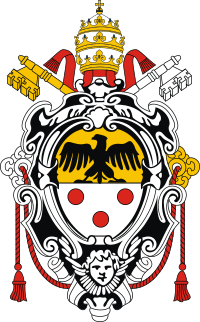Casti connubii
Fifty years after Pope Leo XIII's encyclical Arcanum divinae sapientiae . published Pope Pius XI. on December 31, 1930 the encyclical Casti connubii . It bears the subtitle: On Christian marriage with regard to the current living conditions and needs of families and society and to the errors and abuses that exist in this regard . Casti Connubii is published in AAS 22 (1930), 539-592 as of December 31, 1930. It is addressed to the venerable brothers Patriarchs, Primates, Archbishops, Bishops and other local ordinaries who have peace and communion with the Apostolic See .
structure
The Latin original has no headings, but is only divided into three chapters using Roman numerals. Similar to the previous letter, there are 130 paragraphs in some official translations (here: English and Spanish). and in the Hungarian version an outline. In the French version, there is no structure using numbers or paragraphs, but the sections have headings that summarize the content.
- introduction
- I. The doctrine of matrimonial property according to Augustine
- 1. The children
- 2. Marital fidelity
- 3. The sacrament
- II. Errors against Christian marriage doctrine and mistakes against conjugal life
- 1. The attack on the sanctity of marriage
- 2. Against the children
- 3. Against conjugal fidelity
- 4. Against the sacrament
- III. How can we root out these abuses and restore the respect owed for marriage everywhere?
- (this chapter does not contain any numbered subsections)
About marriage and family
Marriage and the family are divine institutions from the point of view of the encyclical, and so viewed from Pius XI. in this encyclical the family as a divine institution and declares that from marriage the family proceeds. The family arises through the expression of love in the fulfillment of marriage, an act that is always at the same time unifying (love) and generating (life). Should either the uniting or the begetting dimension be absent from the marital act, the disintegration of the marriage and, inevitably, the family follows.
The natural commonality
Pius XI. insists that family community is not just about helping one another. It must also - and primarily - aim that the spouses help each other to shape and perfect the inner man more and more. In this way, through their community of life, they should make ever greater progress in the virtues, above all in the true love of God and neighbor. The natural trust that the spouses should place in one another also consists in growth, in virtue and in the sanctity of marriage.
About contraception
In the encyclical he writes about the conjugal act that by its nature it is only intended for the generation of offspring. The prevention is therefore an immoral behavior, even if the marital intercourse takes place and prevention measures were used. But since this regulation would be deviated from, it is the task of the Catholic Church to defend the doctrines: ... Every sin that is committed in relation to the offspring is in a certain sense also a sin against conjugal fidelity these two gifts were instituted by God ...
About mixed marriage
The Pope expressly forbids interdenominational or interreligious marriage and justifies this with the fact that marriages between people of different faiths are strictly forbidden by the Church, because if one part of the marriage deviates from the faith, the upbringing of the children to a Catholic faith is not guaranteed. Exceptions should only be allowed after the strictest examination and should remain an exception. Since in mixed marriages there is also the risk that the children will distance themselves from the faith, such marriages would damage the common faith.
About eugenics
The encyclical rejects state interference in the right to marry for eugenic reasons, i.e. in couples who, as a result of inheritance, can only expect a physically and / or mentally handicapped offspring. It also prohibits individuals and the state from interfering with the physical integrity of a person in order to prevent the creation of offspring for eugenic or other reasons. It thus rejects sterilization and, in particular, forced sterilization .
annotation
With the encyclical Humanae Vitae , Pope Paul VI attacked. these issues again.
literature
- Pontifical Council for Justice and Peace: Compendium of the Social Doctrine of the Church. German edition. Herder et al., Freiburg im Breisgau et al. 2006, ISBN 3-451-29078-2 .
- Lexicon of World Religions - Christianity and Sacraments , Weltbild Publishing Group, Augsburg, 2006, ISBN 3-8289-4979-7
Individual evidence
- ↑ https://w2.vatican.va/content/pius-xi/en/encyclicals/documents/hf_p-xi_enc_19301231_casti-connubii.html and https://w2.vatican.va/content/pius-xi/es/encyclicals /documents/hf_p-xi_enc_19301231_casti-connubii.html , both June 23, 2017.
- ↑ See https://w2.vatican.va/content/pius-xi/hu/encyclicals/documents/hf_p-xi_enc_19301231_casti-connubii.html (July 24, 2017).
- ↑ See https://w2.vatican.va/content/pius-xi/fr/encyclicals/documents/hf_p-xi_enc_19301231_casti-connubii.html (July 24, 2017).

